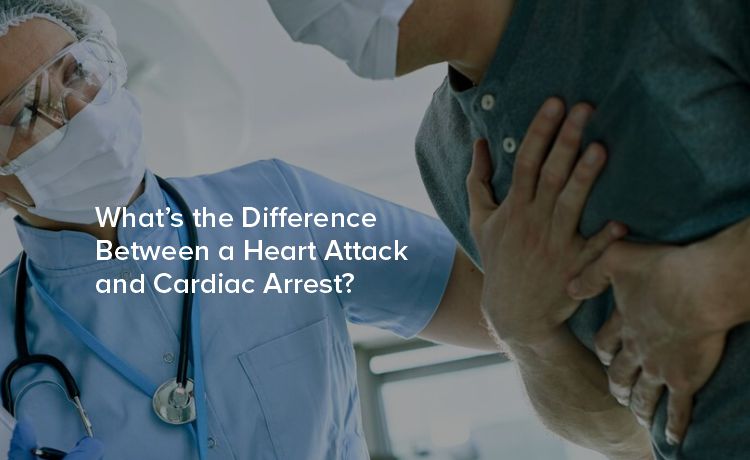
When it comes to heart health, terms like "heart attack" and "cardiac arrest" are often used interchangeably by the public. However, these conditions are distinct in nature, causes, symptoms, and treatments.
A heart attack, medically known as a myocardial infarction, occurs when blood flow to a part of the heart is blocked for a prolonged period. This blockage is usually due to the buildup of fatty deposits, including cholesterol, which form plaques in the coronary arteries. When a plaque ruptures, a blood clot forms around it, further blocking blood flow. This restricted blood flow can damage or destroy part of the heart muscle.
Symptoms of a Heart Attack
Heart attack symptoms can vary between individuals, but common signs include:
Chest Pain or Discomfort: Often described as a weight or tightness in the chest, lasting for several minutes.
Shortness of Breath: This may occur with or without chest discomfort.
Pain in Other Areas: This can include pain in one or both arms, the back, neck, jaw, or stomach.
Cold Sweat: Many people break out into a cold sweat during a heart attack.
Nausea and Light-headedness: Feeling nauseous or dizzy can also be symptoms.
Causes and Risk Factors
The primary cause of heart attacks is coronary artery disease (CAD). Risk factors include:
High Blood Pressure: Puts additional strain on the heart and arteries.
High Cholesterol: Contributes to plaque buildup in arteries.
Smoking: Damages the lining of arteries.
Diabetes: Increases the risk of heart disease.
Obesity: Excess weight can worsen other risk factors.
Lack of Physical Activity: Leads to poor cardiovascular health.
Family History: A history of heart disease in the family increases risk.
Treatment
Immediate treatment for a heart attack involves restoring blood flow, usually through medications like aspirin, thrombolytics, antiplatelet agents, and nitroglycerin. In some cases, procedures like angioplasty or coronary artery bypass surgery might be necessary.
Cardiac arrest occurs when the heart suddenly stops beating effectively, preventing blood from being pumped to the brain, lungs, and other organs. It is primarily an electrical problem, where the heart's electrical system malfunctions, leading to an irregular heartbeat (arrhythmia). The most common arrhythmia causing cardiac arrest is ventricular fibrillation, where the heart quivers instead of pumping blood.
Symptoms of Cardiac Arrest
Cardiac arrest often occurs without warning and symptoms may include:
Sudden Collapse: The person may suddenly lose consciousness and collapse.
No Pulse: There will be no detectable pulse.
No Breathing: The person will stop breathing or will only gasp occasionally.
Loss of Consciousness: The person will not respond to any stimuli.
Causes and Risk Factors
Cardiac arrest can result from various conditions, including:
Heart Attack: A heart attack can trigger cardiac arrest.
Heart Disease: Conditions like cardiomyopathy, heart valve disease, and congenital heart disease increase risk.
Electrical Abnormalities: Conditions like Wolff-Parkinson-White syndrome can disrupt normal heart rhythms.
Drug Overdose: Certain drugs can cause arrhythmias leading to cardiac arrest.
Electrocution or Trauma: Severe injuries can lead to cardiac arrest.
Treatment
Immediate treatment for cardiac arrest involves cardiopulmonary resuscitation (CPR) and defibrillation. CPR helps maintain blood flow to vital organs until professional medical help arrives. Defibrillators deliver an electric shock to restore a normal heart rhythm. Advanced treatments include medications, implantable cardioverter-defibrillators (ICDs), and therapeutic hypothermia.
Cause
Heart Attack: Caused by a blockage in the coronary arteries.
Cardiac Arrest: Caused by an electrical malfunction leading to an irregular heartbeat.
Symptoms
Heart Attack: Chest pain, shortness of breath, pain in other body parts, cold sweat, nausea, lightheadedness.
Cardiac Arrest: Sudden collapse, no pulse, no breathing, loss of consciousness.
Onset
Heart Attack: Symptoms may appear gradually and can last for hours, days, or even weeks.
Cardiac Arrest: Symptoms occur suddenly and require immediate response.
Treatment
Heart Attack: Medications to restore blood flow, surgical procedures like angioplasty.
Cardiac Arrest: Immediate CPR and defibrillation, followed by advanced medical care.
For Heart Attack
Healthy Diet: Opt for a diet low in saturated fats, trans fats, cholesterol, and sodium.
Regular Exercise: Aim for at least 150 minutes of moderate aerobic activity or 75 minutes of vigorous activity each week.
Avoid Smoking: Smoking cessation drastically reduces heart disease risk.
Regular Check-ups: Regular health screenings to monitor blood pressure, cholesterol levels, and diabetes.
Weight Management: Maintain a healthy weight to reduce stress on the heart.
For Cardiac Arrest
Heart Health Management: Control existing heart conditions with medications and lifestyle changes.
Monitor for Arrhythmias: Regular check-ups if you have a known electrical abnormality in your heart.
Education and Training: Learn CPR and ensure access to an automated external defibrillator (AED) in community spaces.
Avoid Drug Abuse: Avoid substances that can induce cardiac arrhythmias.
Manage Stress: Stress management techniques like meditation, exercise, and adequate sleep.
Understanding the differences between a heart attack and cardiac arrest can empower you to take proactive steps towards heart health and act swiftly in emergencies. Both conditions are serious and require immediate medical attention, but their underlying causes, symptoms, and treatments are distinct. Citizens Specialty Hospital provides the best cardiology treatment in Hyderabad.